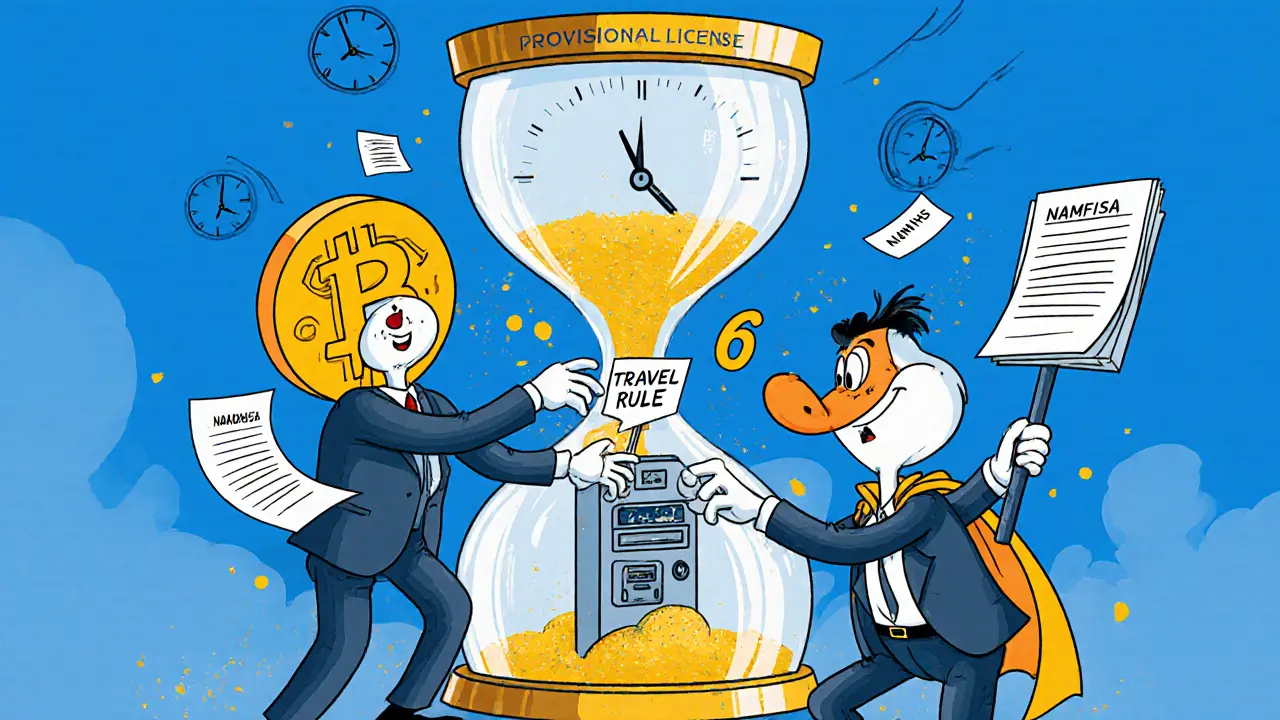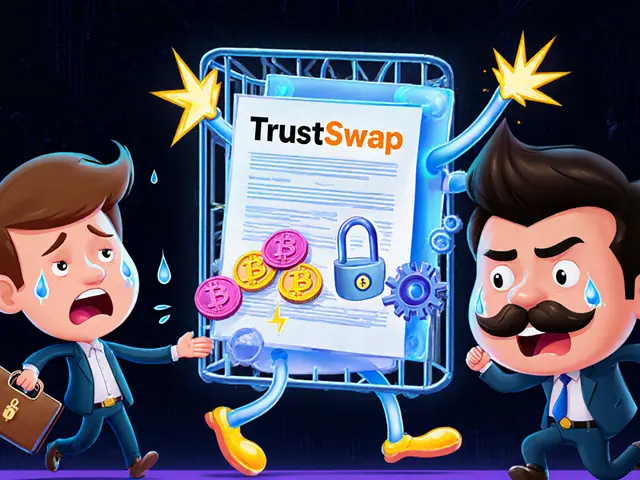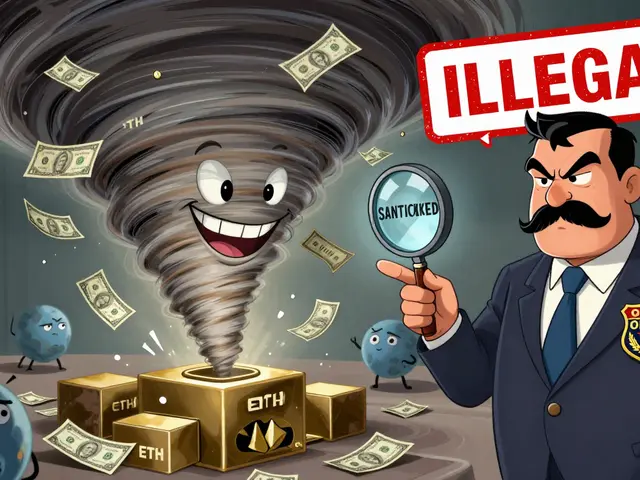
Crypto Transaction Risk Calculator
Transaction Risk Assessment
Check if your crypto transaction meets Namibia's Travel Rule requirements and assess potential account risks.
As of 2025, if you're trying to use Bitcoin or any other cryptocurrency in Namibia, you're walking a tightrope. The country doesn't officially ban crypto - but its banks sure act like it does. You can't buy coffee with Bitcoin at your local shop. You can't deposit crypto earnings into your NedBank or Standard Bank account without risking a freeze. And if you run a crypto exchange, you're stuck in a six-month limbo, waiting for permission to even start talking to customers.
Why Banks in Namibia Don't Trust Crypto
Back in 2018, the Bank of Namibia (BON) sent a clear message: crypto isn't money here. In a public statement, they declared that cryptocurrencies like Bitcoin aren't legal tender, aren't backed by the central bank, and if you lose money on them, you're on your own. No refunds. No protection. No recourse. That wasn't just a warning - it was a red flag to every bank in the country. Since then, banks have interpreted that message as a green light to restrict accounts linked to crypto. People who joined crypto investment groups, traded on international exchanges, or even just held Bitcoin in a wallet have reported sudden account freezes. Legal experts say this is overreach. The Bank of Namibia doesn't have the power to make laws - only to enforce them. But in practice, they're acting like they do. That creates chaos for regular people. One trader in Windhoek lost access to his savings account after posting about buying Ethereum on a forum. He had to go to court just to get his money back.The Virtual Assets Act of 2023: A Legal Loophole
In June 2023, Namibia passed the Virtual Assets Act of 2023 - a major shift. For the first time, the government acknowledged that digital assets exist and need rules. The law created a licensing system under NAMFISA (Namibia Financial Institutions Supervisory Authority). Any company offering crypto services - exchanges, wallet providers, trading platforms - now needs a license to operate. No license? You're breaking the law. But here's the twist: the law licenses businesses, not users. It doesn't say crypto trading is legal for individuals. It just says companies can apply to serve customers - if they pass a million checks. So technically, you can't legally buy Bitcoin in Namibia... but a licensed company might be allowed to sell it to you. That's the gray zone everyone's stuck in.The Provisional License Trap
In January 2025, the Bank of Namibia gave provisional licenses to three companies: Landifa Bitcoin Trade CC, United PayPoint (Pty) Ltd, and Mindex Virtual Asset Exchange. Sounds promising, right? Not really. These companies aren't allowed to do business with anyone in Namibia. Not yet. They're in a regulatory sandbox - a testing ground where they must build systems, hire staff, and prove they can follow every rule before they're allowed to open their doors. Even their names aren't public. Customers can't find them online. They can't advertise. They can't accept deposits. They can't process transactions. And the clock is ticking. The provisional period is six months. Two of the three companies asked for extensions - one until May, another until July. Mindex got an extension until November 21, 2025. That means, as of today, they're still waiting. If they don't pass the final inspection by then, their license dies. No second chances. No appeals. Just silence.
The Travel Rule: Tracking Every Big Transaction
Under the new law, any crypto transaction over NAD 20,000 (about $1,000 USD) triggers the Travel Rule. That means every exchange must collect and share:- Full name of sender and receiver
- Government ID number
- Bank account or wallet address
- Reason for the transfer
What Happens to Your Bank Account If You Trade Crypto?
This is where things get personal. If you're an individual who buys, sells, or holds crypto - even just once - your bank might flag your account. You might get a call from your bank saying your account is under review. They might freeze it. They might close it. They might not explain why. There's no public list of who’s banned. No official policy. Just rumors and real cases. One woman in Swakopmund had her savings account shut down after using a peer-to-peer app to buy Bitcoin. She had no criminal record. No suspicious activity. Just crypto. She spent three months fighting to get her money back. She won - but only after hiring a lawyer. Banks say they're following BON's 2018 guidance. But that guidance was never a law. It was a warning. And now, it's being used as a weapon against ordinary citizens.
Is Crypto Trading Legal in Namibia? The Official Answer
Ask the Bank of Namibia if crypto trading is legal, and they'll say: "No. We do not recognize cryptocurrencies as legal tender." Ask NAMFISA if licensed exchanges can operate, and they'll say: "Yes - if they meet all requirements." So what’s the truth? It’s a contradiction. The government lets companies apply for licenses to handle crypto - but says the public can’t legally trade it. That’s not regulation. That’s control. The result? Crypto traders operate in the shadows. People use offshore exchanges. They use P2P apps. They trade in cash. They hide their activity. And every time they do, they risk losing access to their bank accounts.What’s Next for Crypto in Namibia?
The provisional licenses expire in late 2025. What happens after that? If the three companies pass inspection, they’ll become the only legal gateways to crypto in Namibia. That could mean:- Only three platforms can sell Bitcoin
- High fees due to lack of competition
- Strict KYC - you’ll need ID, proof of address, and bank statements just to buy $100 in crypto
- Slow processing times - every transaction gets flagged and reviewed
What Should You Do If You Use Crypto in Namibia?
If you're holding Bitcoin, trading on international platforms, or thinking about starting a crypto business in Namibia, here’s what you need to know:- Don’t link your crypto activity to your main bank account. Use separate accounts if possible.
- If you're a trader, keep records of every transaction - dates, amounts, wallet addresses.
- Don’t use unlicensed exchanges. Even if they’re cheaper, you’re at risk of losing everything.
- If your account is frozen, get legal help immediately. Banks can’t legally close your account without cause.
- Watch for announcements from NAMFISA. The next wave of licenses could change everything.
Is cryptocurrency legal to trade in Namibia as of 2025?
No, cryptocurrency trading is not officially legal for individuals in Namibia. While the Virtual Assets Act of 2023 allows licensed companies to offer crypto services, the Bank of Namibia still states that cryptocurrencies are not legal tender and does not recognize their use by the public. This creates a legal gray area where businesses can apply for licenses, but ordinary people have no legal protection when trading crypto.
Can I open a bank account if I trade cryptocurrency?
It’s risky. Many banks in Namibia - including NedBank and Standard Bank - have frozen or closed accounts linked to crypto activity. Even if you haven’t broken any laws, banks may act on the Bank of Namibia’s 2018 warning that crypto carries no protection. If you trade crypto, avoid using your primary bank account and keep clear records of all transactions.
What is the Virtual Assets Act of 2023?
The Virtual Assets Act of 2023 (Act No. 10 of 2023) is Namibia’s first comprehensive law regulating digital assets. It requires all Virtual Asset Service Providers (VASPs) - like exchanges and wallet providers - to register with NAMFISA, implement anti-money laundering rules, and comply with the Travel Rule for transactions over NAD 20,000. It does not legalize crypto for personal use, only for licensed businesses.
Why are some crypto companies in Namibia on provisional license?
Three companies - Landifa Bitcoin Trade CC, United PayPoint, and Mindex Virtual Asset Exchange - received provisional licenses in January 2025. They’re not allowed to serve customers yet. They must use this six-month period to prove they have proper infrastructure, staff, and compliance systems. Only after a final inspection can they get full authorization. Two have already requested extensions.
What is the Travel Rule in Namibia’s crypto law?
The Travel Rule requires all licensed crypto exchanges to collect and share detailed information for transactions over NAD 20,000 (about $1,000). This includes the full names, ID numbers, and account details of both sender and receiver. The goal is to prevent money laundering, but it also removes anonymity from crypto transactions in Namibia.
Can I use a foreign crypto exchange in Namibia?
Technically, yes - but it’s risky. Foreign exchanges aren’t licensed under Namibia’s Virtual Assets Act, so they’re not regulated. If you use them, you have no legal protection. Your bank might freeze your account. You could lose funds. And if you move large amounts, you may trigger reporting requirements under the Travel Rule - even if the exchange doesn’t report it.





